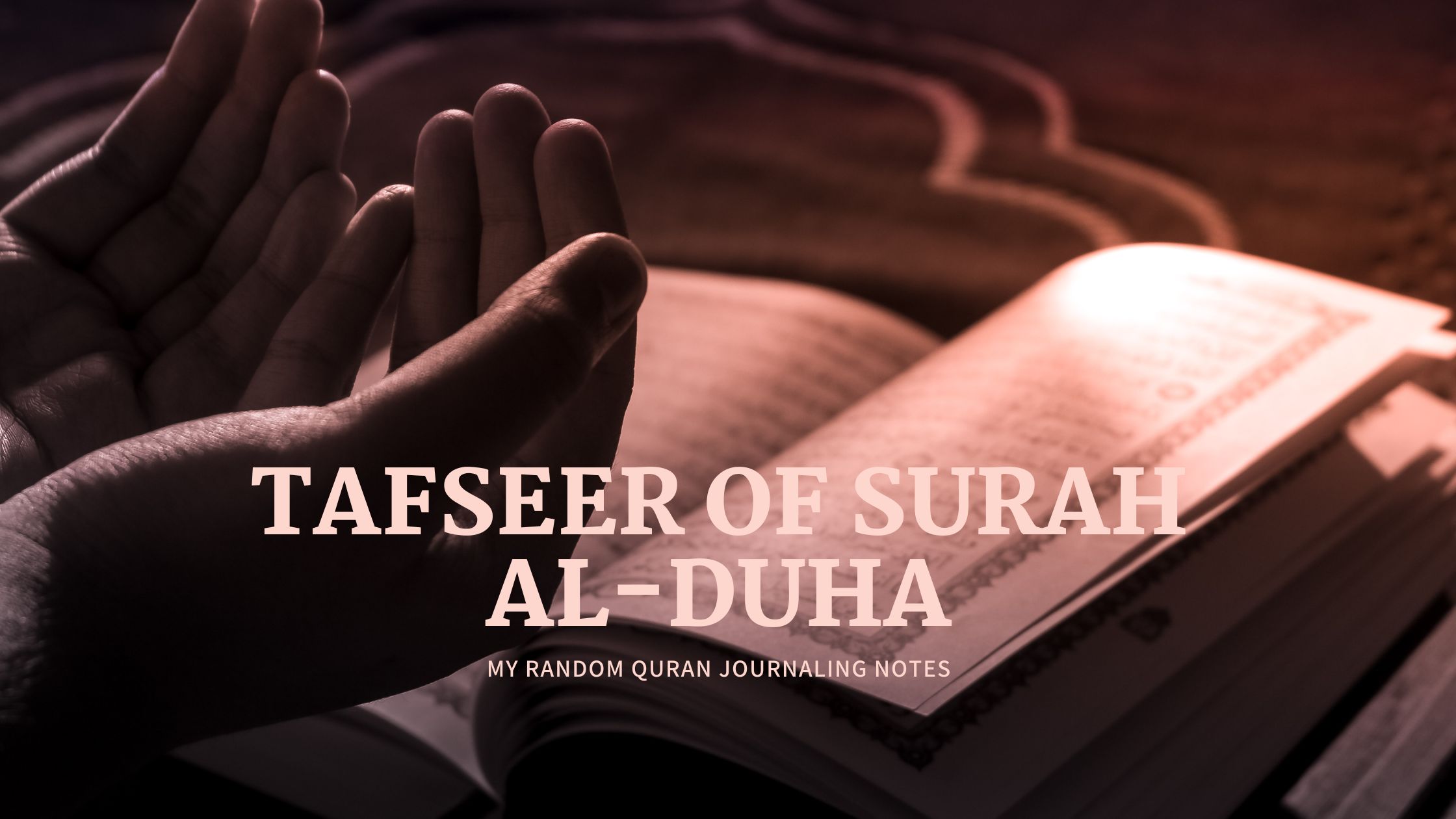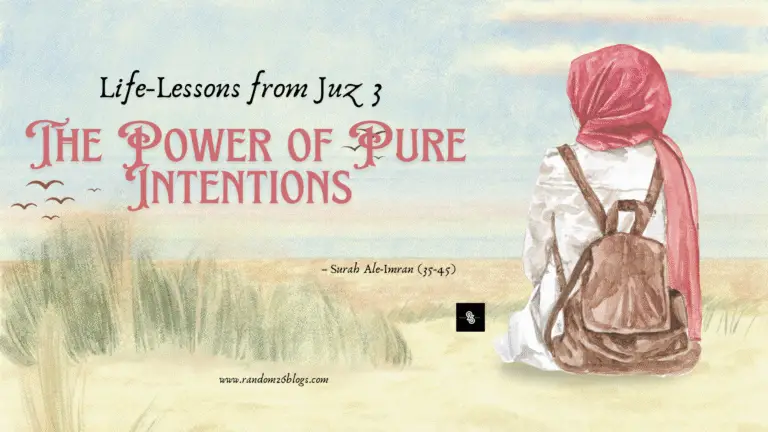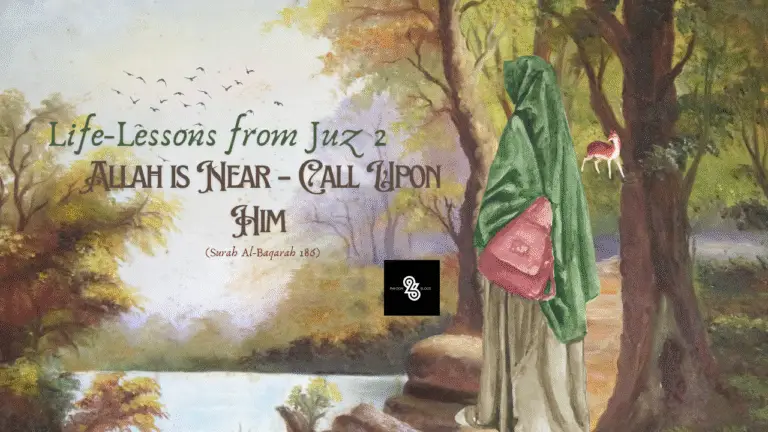
Table of Contents
Tafseer of Surah Al-Duha by Sheikh Dr. Yasir Qadhi

Background
There was a significant period when the Prophet Muhammad (PBUH) did not receive any revelation. Some scholars suggest this interval lasted up to six months. During this time, the Prophet (PBUH) began to doubt himself, wondering if he had done something wrong. The situation was exacerbated by Abu Lahab’s wife taunting him, saying, “You haven’t received any revelation.”
Amidst this difficult and upsetting period, Allah (SWT) revealed Surah Al-Duha to console and reaffirm the Prophet (PBUH).
First Three Verses: Addressing Feelings of Worthlessness
Allah (SWT) begins Surah Al-Duha with:
وَٱلضُّحَىٰ “By the morning brightness,”
The dawn symbolizes new beginnings, positivity, and hope. It represents the renewal of Allah’s (SWT) blessings and the end of darkness, metaphorically addressing the Prophet’s (PBUH) worries.
وَٱلَّيۡلِ إِذَا سَجَىٰ “And [by] the night when it covers with darkness,”
Night, with its stillness, is a time when the worries of the world fade, offering peace and reflection.
By swearing on the dawn and the night, Allah (SWT) emphasizes the transition from darkness to ligh.
مَا وَدَّعَكَ رَبُّكَ وَمَا قَلَىٰ “Your Lord has not taken leave of you, [O Muhammad], nor has He detested [you].”
This beautiful verse clears all negativity, reassuring the Prophet (PBUH) that Allah (SWT) has neither abandoned nor detested him. As the Ummah of the Prophet (PBUH), this message extends to us as well, reminding us that Allah (SWT) never abandons us.

Life and Hereafter: A Perspective Shift
وَلَلۡأٓخِرَةُ خَيۡرٞ لَّكَ مِنَ ٱلۡأُولَىٰ “And the Hereafter is better for you than the first [life].”
This verse redirects our focus to the Hereafter, the ultimate destination, reminding us that this life, despite its trials, is temporary.
وَلَسَوۡفَ يُعۡطِيكَ رَبُّكَ فَتَرۡضَىٰٓ “And your Lord is going to give you, and you will be satisfied.”
Allah (SWT) promises to give us what will satisfy us, not necessarily what we want, highlighting His wisdom and knowledge of what is best for us.
Reflecting on Allah’s Blessings
Allah (SWT) poses three rhetorical questions to remind the Prophet (PBUH) and us of His past favors:
أَلَمۡ يَجِدۡكَ يَتِيمٗا فَـَٔاوَىٰ “Did He not find you an orphan and give [you] refuge?”
وَوَجَدَكَ ضَآلّٗا فَهَدَىٰ “And He found you lost and guided [you],”
وَوَجَدَكَ عَآئِلٗا فَأَغۡنَىٰ “And He found you poor and made [you] self-sufficient.”
These questions serve as powerful reminders of Allah’s (SWT) continuous blessings throughout our lives. Despite challenges, Allah (SWT) has always provided, guided, and sufficed us.

Positive Contributions and Gratefulness
The next three verses emphasize our duty to contribute positively and acknowledge Allah’s (SWT) blessings:
فَأَمَّا ٱلۡيَتِيمَ فَلَا تَقۡهَرۡ “So as for the orphan, do not oppress [him].”
وَأَمَّا ٱلسَّآئِلَ فَلَا تَنۡهَرۡ “And as for the petitioner, do not repel [him].”
وَأَمَّا بِنِعۡمَةِ رَبِّكَ فَحَدِّثۡ “But as for the favor of your Lord, report [it].”
We are encouraged to:
- Treat orphans with kindness and compassion.
- Be generous and considerate to those who ask for help.
- Speak positively about Allah’s (SWT) blessings and avoid focusing on negatives.
By sharing happiness and positivity, we align ourselves with Allah’s (SWT) guidance, fostering a sense of gratitude and contentment in our lives.

My Random Quran Journaling Notes
Surah Al-Duha serves as a powerful reminder of Allah’s (SWT) unwavering support and love, urging us to remain positive, grateful, and compassionate. It teaches us to focus on the blessings we have, contribute positively to the lives of others, and trust in Allah’s (SWT) wisdom and mercy.






4 thoughts on “Tafseer Of Surah Al-Duha:My Random Quran Journaling Notes”